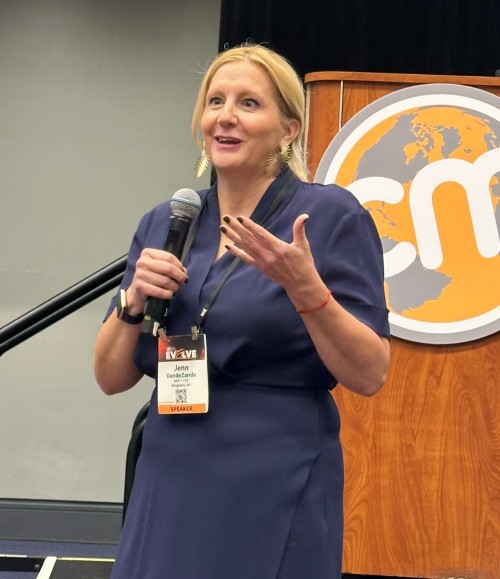In an age where the allure of artificial intelligence (AI) has captured the attention of so many of us in the B2B marketing industry, the essence of authentic human connection in storytelling is more important than ever. As the dust settles on the GenAI hype cycle, we’ll see that successful B2B marketers are those who recognize the value of integrating emotion and empathy into their narratives and ensuring their messages resonate with audiences. As I like to say, “less mechanical and more meaningful.”
This was at the center of a presentation at Content Marketing World given by my good friend Jenn VandeZande, Editor in Chief, Head of Digital Engagement, I + CX at SAP with an assist from Robert Rose of Content Marketing Institute.
The Human Touch in a Tech-Driven B2B Marketing World:
With each successive generation becoming increasingly dependent on technology, one might wonder where this leaves the human aspect of storytelling and communication. Jenn from SAP emphasized a surprising stat: a whopping 81% of marketers believe that the roles of content writers are at risk due to AI.
“81% of marketers think content writers jobs are at risk because of AI. That said, those that have skills at strategy, creativity and storytelling will come out on top.” Jenn VandeZande, Editor in Chief, Head of Digital Engagement, I + CX at SAP
However, a quick dive into SAP funded, “The Future of Commerce,” site managed by Jenn and her team reveals a different story. This platform prioritizes content that’s intriguing to SAP’s target audience rather than merely reflecting what’s trendy for SAP. Impressively, this content-centric approach has thrived without the boost of paid advertisements.

Jenn VandeZande, Editor in Chief, Head of Digital Engagement, I + CX at SAP
The Magic of B2B Authenticity:
The authenticity of the content on “The Future of Commerce” has attracted significant organic traction. Jenn shared that 70% of the traffic is organic, with 30% being return visitors. Authentic content that resonates on a human level not only establishes trust but also facilitates genuine affinity with the brand. In Jenn’s words, business professionals are humans first, and connecting with them on a personal level is essential for brand success.
It’s evident that while robots might churn out content, they cannot replicate the nuanced, genuine, and relatable narratives that humans craft. The paradigm shift occurs when brands view content marketing not just as a touch-point in the buyer journey but as an ongoing dialogue even outside that journey.
Nurturing B2B Audiences the Right Way:
Interestingly, subscribers to “The Future of Commerce” aren’t bombarded with marketing messages. SAP recognizes the importance of gauging commercial intent. Only when a user demonstrates this intent, say by downloading a whitepaper, are they moved into a nurture track.
One might wonder, on a website dominated by such authentic content, when’s the right time to transition readers to more commercial content for SAP? According to Jenn, every article should thoughtfully guide readers with CTAs, seamlessly intertwining with adjusted landing pages to enhance the user’s journey.
In Defense of Human Writers:
To ensure that the age-old art of writing isn’t overshadowed by AI, certain measures can be adopted:
- Be Prepared: Understand the current utilization of AI in your content processes.
- AI Roadmap: Establish clear governance, responsible, accountable, consulted, and informed (RACI), and use cases for AI integration.
- Practice Quality: Ensure content quality is maintained, periodically checking for AI usage.
- Leverage AI Wisely: While the focus should be on human intent and content, AI can still be employed to streamline processes and enhance user experience.
AI, no matter how advanced, is ultimately limited to what we teach it. With momentum towards substantially greater levels of automation when it comes to content development, the essence of meaningful storytelling lies in authenticity, emotion, and a genuine human touch. Brands that recognize and act upon this truth will thrive, creating genuine, long-lasting relationships with their audience.
For more B2B content marketing insights, check out some of our most popular posts:
- Growth Strategy: How Content Marketing Propels B2B Brand Growth Today
- Creativity’s Rising Role in B2B Marketing
- Take the Lead with Full-Funnel B2B Lead Gen
- Why Intent-Qualified Organic Traffic Will Power the Future of B2B Marketing
- Why Great Top-of-Funnel Content Matters for Lead Generation
Learn more about the content marketing solutions offered by TopRank Marketing.



